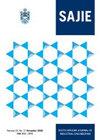IMPLEMENTATION OF MACHINE LEARNING TECHNIQUES FOR PROGNOSTICS FOR RAILWAY WHEEL FLANGE WEAR
IF 0.5
4区 工程技术
Q4 ENGINEERING, INDUSTRIAL
引用次数: 0
Abstract
Machine learning has become an immensely important technique for automatically extracting information from large data sets. By doing so, it has become a valuable tool in various industries. In this investigation, the use of machine learning techniques for the production of railway wheel prognostics was investigated. Metrorail’s railway wheel wear data was used as a case study for this investigation. The goal was to demonstrate how machine learning can used on the data generated by Metrorail’s routine operations. Three machine learning models were implemented: logistic regression, artificial neural networks, and random forest. The investigation showed that all three models provided prognoses with an accuracy of over 90 per cent, and had an area under curve (AUC) measurement exceeding 0.8. Random forest was the best performing model, with an AUC measurement of 0.897 and an accuracy of 93.5 per cent.机器学习技术在铁路轮缘磨损预测中的应用
机器学习已经成为从大型数据集中自动提取信息的一种非常重要的技术。通过这样做,它已成为各行各业的宝贵工具。在这项调查中,研究了机器学习技术在铁路车轮预测生产中的应用。本文以地铁轮毂磨损数据为研究对象。目的是演示如何将机器学习用于地铁日常运营产生的数据。实现了三种机器学习模型:逻辑回归、人工神经网络和随机森林。调查表明,所有三种模型提供的预测精度超过90%,曲线下面积(AUC)测量超过0.8。随机森林是表现最好的模型,AUC测量值为0.897,准确率为93.5%。
本文章由计算机程序翻译,如有差异,请以英文原文为准。
求助全文
约1分钟内获得全文
求助全文
来源期刊
CiteScore
1.10
自引率
20.00%
发文量
15
审稿时长
6 weeks
期刊介绍:
The South African Journal of Industrial Engineering (SAJIE) publishes articles with the emphasis on research, development and application within the fields of Industrial Engineering and Engineering and Technology Management. In this way, it aims to contribute to the further development of these fields of study and to serve as a vehicle for the effective interchange of knowledge, ideas and experience between the research and training oriented institutions and the application oriented industry. Articles on practical applications, original research and meaningful new developments as well as state of the art surveys are encouraged.

 求助内容:
求助内容: 应助结果提醒方式:
应助结果提醒方式:


